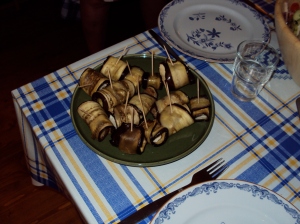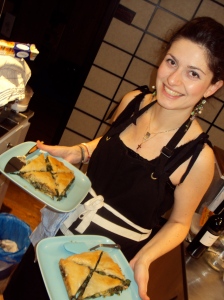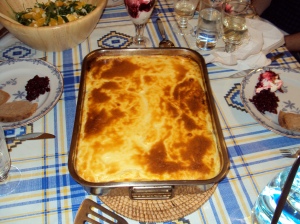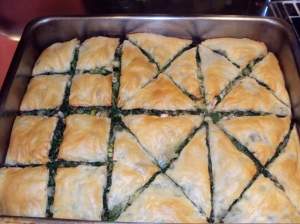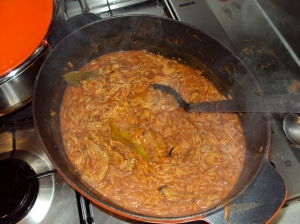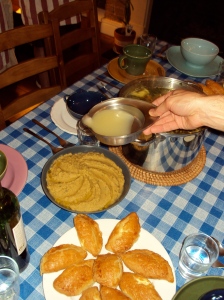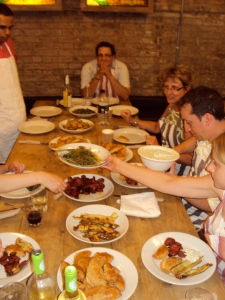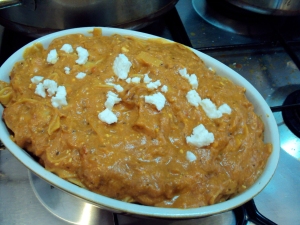There is a reason why I rarely teach mousaka in the class, it’s very time-consuming, tiring for the students mainly and it tests your patience. But also the hard work makes it difficult for me to find a second to take pictures of what the students cook and what they achieve.
For this class we used just over 2,5 kilos of aubergines per tray and we made two trays of mousaka.
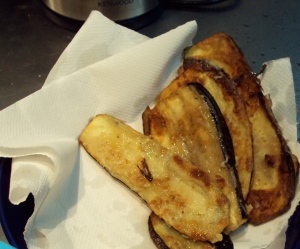
You can use potatoes as well, it’s making the cooking slightly easier but then you lose some of the taste the aubergines give to the dish. So we started with slicing, salting and draining over five kilos of aubergines, to make the frying process easier.

While the classes started as a fun thing and a way of introducing the real Greek food back into the London scene, they have also taken a slightly more serious approach in that I do talk about how to eat and cook healthier as well. As I said both in the beginning and at the end of this class, mousaka is not something we should eat every month…. With all the cheese and milk and eggs that go in it, and all the fried aubergines, its taste is divine for sure, but it should probably be a treat for maybe once in a while. And though frying is to be avoided generally, if you are going to fry something, do use a really good extra virgin olive oil, as it stands a better chance to avoid giving you too much smoke to inhale or burning your food. Opposite to what a lot of people believe, it is the healthiest oil to use when frying. However, if we are cooking a dish like mousaka, we might as well get it right, with all its glory and forget about the health aspects for just this once.
The other step for the mousaka is to make the mince. This is probably the easiest bit, you just have to be careful to have a mince sauce which is not too runny, or it will ruin your layout of the mousaka and drip through to the bottom of your tray.
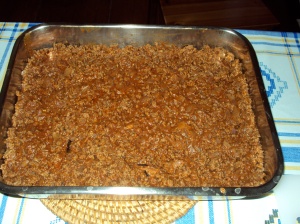
We do a sandwich of aubergine slices with the mince in the middle before continuing to the final step, which is the hardest and most feared by many, making the Greek béchamel sauce, which is poured over the last layer of aubergines.

But before the béchamel, we need to refuel. I had baked some bread ahead of the class to offer it with some extra virgin olive oil but I had also made a Greek favourite dessert, mpougatsa, (=μπουγάτσα) a semolina custard like cream between crispy fyllo pastry sheets that is served with icing sugar and cinnamon, or syrup when it’s also known as galaktoboureko.

And here below are the individual portions that were served during the cooking session to keep everyone going for a little while longer.

On top of the mpougatsa, one of my students, all the way from Spain, brought some Spanish authentic jamón to share with the class. So I served it with some extra virgin olive oil and the home baked spelt bread with nuts and seeds. Thank you Mauro for the unexpected gift!
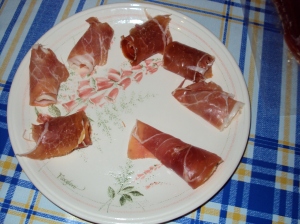

Just like it’s important to have a thick mince sauce, it’s crucial to have a thick and smooth béchamel. Thick so it won’t slide through your layers of mince and aubergine and burn at the bottom of tray with your mousaka dish and smooth, well who wants lumps of flour balls in their mouth? Therefore, it’s important to get started with a creamy base of flour and butter before adding the milk and the rest of the ingredients. Also, there’s a lot of whisking going on, for a very long time.
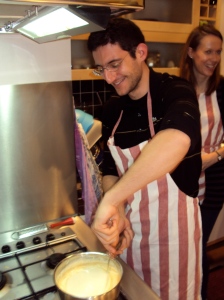

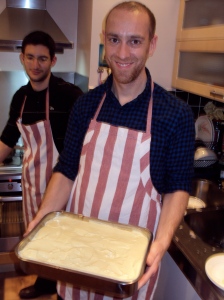
Apart from the mousaka we made two salads as well, one with rocket leaves, orange wedges and extra virgin olive oil and lemon juice plus some sprinkled almond flakes on top and then a fresh beetroot salad with yoghurt, walnuts and fresh garlic.

When you’re so busy cooking a demanding dish, it is nice to make something that requires less effort as side dishes. Besides, serving a rich dish like mousaka requires simple and light and refreshing dishes to go with.
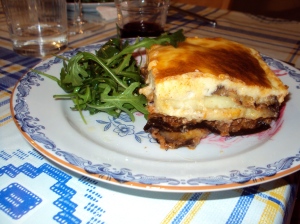
Everyone had two portions of mousaka after the cookery class which lasted a few hours and everyone also got to take home a big portion of the dish. My sponsor Total Greek Yoghurt also offered pots of yoghurt for each participant to take home in a cooling goodie bag.
Thank you Total Greek Yoghurt, Fage and Kenwood for sponsoring the classes with your products.
And a big warm thank you to all the students who joined and join the classes to learn how to cook some of the lovely food Greek cuisine has to offer, both known and unknown dishes.
What’s really exciting is this email I received a couple of days ago from one of my students saying he had invited his family over and cooked the dishes he learnt at the course and chose to make the mousaka as the main! I was very proud and happy at the same time, because the classes are about cooking together and eating together, but also about taking home the skills you’ve learnt and making the dishes again to your loved ones!
For more pictures, updates and info on classes join the mailing list on greekcookeryclass(AT)gmail.com and keep an eye out on www.facebook.com/GreekCookery














